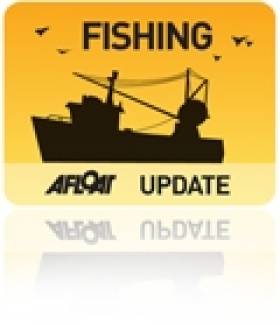Displaying items by tag: fishing vessels
Norway Detains Two Irish Fishing Vessels
The Norwegian coastguard has detained two Irish fishing vessels.
The two 37-metre-long vessels had steamed from West Cork to fish for an Irish quota of Atlanto-Scandian herring in Norwegian waters.
Danish website FiskerForum reports that the Norwegian authorities declined to comment, stating only that the case has just been opened.
It is understood that the two vessels had both declared catches amounting to 265 tonnes of Atlanto-Scandian herring to the Norges Sildesalgslag pelagic auction.
The two vessels were escorted into the Norwegian port of Tromsø by Coastguard vessel Svalbard.
FiskerForum says there are indications that there may have been a breakdown in communications between national authorities.
It says the skippers of the Irish vessels said that they checked with their authorities for restrictions before heading for the Norwegian coast. The Norwegian regulation on a closed area was recently updated, and the information may have “failed to get through”, it says.
Read FiskerForum here
State Regulator Seeking Fishing Vessels for Remote Electronic Monitoring Pilot Project
The State’s fisheries regulator is seeking a number of Irish-registered fishing vessels to take part in a pilot project involving remote electronic monitoring (REM).
The Sea Fisheries Protection Authority (SFPA) says it has written to fisheries producer organisations to encourage participation by a small number of vessels in the pilot project, having failed to find volunteers among the fleet so far itself.
The technology to monitor fishing may become a legal requirement within the EU, and the pilot project is part of a larger EU north-western waters initiative, the SFPA says.
REM allows for the remote monitoring of fishing vessels, providing “valuable information on fishing activity and compliance with regulatory requirements, including the landing obligation”, the SFPA says.
“The legislative introduction of REM in fisheries control at European level is nearing certainty, having passed through the initial consultative stage, through the European Parliament and back for final consultations,” SFPA executive chair Paschal Hayes says.
He says there has been work in areas of Britain, including Scotland, to mandate the use of REM for some areas and some fisheries, “which may impact Irish fishers”.
“Therefore, we feel it is important that we gain real and meaningful experience of REM and put ourselves in a position where both the SFPA and the Irish fishing industry can guide and advise on the technicalities of REM, its introduction and uses,” he says.
“Ireland holds the largest stake in the northwestern waters, and gaining experience of REM is, we feel, of significant importance for our fishing industry,” he says.
“We believe that this technology has the potential to bring significant benefits to the Irish fishing industry and in assisting the SFPA to fulfil its control and enforcement mandate for all fishing vessels operating in Ireland’s exclusive economic zone,” he says.
“Efforts by SFPA personnel to secure volunteer fishing vessels to participate in the REM pilot project have, to date, proved unsuccessful,” he says.
“Therefore, we are seeking the advocacy of Ireland’s fishery producer organisations to encourage a small number of Irish registered fishing vessels to participate in the REM pilot project,” he explains.
“The SFPA wishes to work with the Irish fishing industry to manage the introduction of REM, and to explore its potential benefits as well as address any concerns through the pilot project,” Hayes says.
#MARINE NOTICE - The latest Marine Notice from the Department of Transport, Tourism and Sport (DTTAS) draws mariners' attention to the official report on the sinking of the fishing boat Ainmire and its recommendations for safety on board all fishing vessels.
As reported in September last year on Afloat.ie, the report by the Marine Casualty Investigation Board found that a breach in the engine compartment caused the Ainmire to take on water and sink off the coast of Scotland in April 2011.
The report concluded that the failure of a sea water cooling pipe in the engine room was the most likely cause of the flooding, and noted that the pipework had not been renewed during the life of the vessel.
Investigators also noted that the bilge pump was located under the floor plates in the engine room as was this inoperable when the water level rose in the compartment.
Marine Notice No 58 of 2012 - a PDF of which is available to read and download HERE - reminds fishing vessel operators that large sea-water inlets in engine rooms make their boats vulnerable to severe flooding if they fail.
It is recommended that these pipes should be checked for corrosion every year, especially around the welded joint at the hull. Ultrasonic thickness testing of the pipework should also be considered.
Moreover, such pipework can be eroded quickly by stray currents, so electrical equipment should be checked regularly, while the location of bilge pumps in the engine room should be carefully considered
Notice on Mandatory Training for Navigation by ECDIS
The latest Marine Notice from the Department of Transport, Tourism and Sport details the training requirements for the use of Electronic Chart Display and Information Systems (ECDIS) as a primary means of navigation.
Mandatory carriage requirements for ECDIS will be phased in between 1 July 2012 and 1 July 2018 according to ship size and class. All shipowners, masters and deck officers of merchant and fishing vessels, yachtsmen, nautical colleges and other users are required to complete both generic and ship specific training for the use of ECDIS.
The notice outlines the following as meeting the requirements for generic training:
- A NARAS Operational course completed after 1 January 2005.
- An ECDIS programme based on the IMO Model ECDIS course (1.27) approved by the Irish Maritime Administration.
- An ECDIS programme based on the IMO Model ECDIS course (1.27) approved by the maritime administration of an EU Member State or by a country recognised by Ireland under STCW 78.
As far as ship-specific training, the following areas should be covered in training delivered by the ECDIS manufacturer (computer-based training packages are acceptable):
- familiarisation with available functions
- familiarisation with the menu structure
- display setup
- setting of safety values
- recognition of alarms and malfunction indicators and the actions to be taken
- route planning
- route monitoring
- changing over to backup systems
- loading charts and licenses
- updating of software
Further details are available in Marine Notice No 51 of 2011, available to read or download as a PDF HERE.































































